Snippets of our Time in Bhutan and Yemen
Robert Tyabji, Mumbai, 29 January 2017
The Lalkaka Family Fund invited Hootoksi and me to speak on our experiences working abroad, at their General Meeting held on 29 January 2017 in Mumbai. Of the 7 countries we've lived in, we chose to talk about Bhutan and Yemen which had made lasting impressions on us and which we thought would interest the audience most.
This is how the presentation went:
HOOTOKSI
Families are like branches on a tree.We grow in different directions, yet our roots are one. Thank you Cawas, Shireen, Aban, Navaz, Gitanjali, Soonu, Tosher & Adil for juggling dates around so that Shehernavaz, Kershasp, Robert and I could attend the AGM of the Lalkaka Family, a family that we are very proud to be a part of.

I would also like to thank all the Committee Members & Trustees, both past and present for giving so freely of their time and ensuring that the vision of our ancestors remains intact, and that the Lalkaka Family Fund continues to grow and prosper.

Our beloved mama was very proud of her Lalkaka heritage and she is definitely smiling today as she sees us gathered here for the 98th AGM of the Lalkaka Family Fund. Robert & I are delighted to share a few memorable incidents from the 30 years we spent living and working in some of the least developed countries of the world.

ROBERT
I retired from UNICEF in 2003 from Nepal having served 30 years in 6 countries of Asia & Africa.

Our first 7 years were in New Delhi where our three boys Michel, Farhad and Adil, were born. I started working as a communication specialist with UNICEF, at their South and Central Asia Regional Office, in 1972.

In 1977 I was tasked to help the Bhutan Government make a film to commemorate the International Year of the Child. The film was about a benevolent Bhutanese King and his relationship with the Moon. It promoted Bhutan’s development efforts and raised millions for UNICEF-assisted projects in the country. The Bhutan government then requested UNICEF to post me there ... which resulted in my transfer to Thimphu, and subsequent postings.

4 years later we said goodbye to the pristine air and quiet splendour of Bhutan’s valleys and mountains, and moved to the stark wilderness of ...

...Somalia… and the fascinating clan culture of the nomadic Somali people. Traditionally, the Somali spend their entire lives tending their herds of camel, cattle and goats.

Somali nomad families migrate seasonally between grazing grounds, carrying their homes and belongings on camel-back. Their annual migratory pattern involves long treks across arid bushland thickly covered in places by the thorn trees on which the camels thrive.

4 years later we moved to the Republic of Yemen with its steep mountains, empty deserts, spectacular architecture, and unspoiled Islamic culture. After five years in Yemen we moved on to the ...

...Magic of the game parks, rivers and lakes of Tanzania. Here an area of 42,000 square kilometres is dedicated to wildlife.

The country’s 17 national parks are home to 20 percent of Africa’s large-mammal population, as well as the dramatic cross-border migration of wildebeest and zebra.

The area is also home to the stately and charming Masai people, seen here with someone sitting amongst you today.

Our 7 years in Tanzania were a priceless introduction to the beautiful Bantu people of sub-Saharan Africa. We learned to speak some Swahili, the official language of Tanzania and lingua franca of the African Great Lakes region. It’s spoken by some 150 million people across most of eastern, south eastern and central Africa.
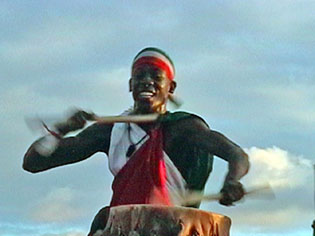
We grew to appreciate the rhythms of African music and dance forms. Drums, drums and more drums!

Typically, Arfican dance forms depict tribal lifestyles. Most of them are vigorous and acrobatic.
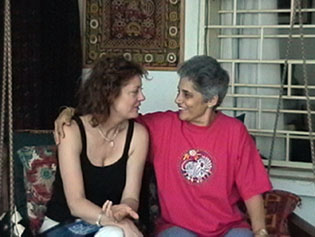
UNICEF was the first UN agency to use celebrities to support its mission. When Susan Sarandon visited, she asked Hootoksi to take her shopping for African sarongs. In the crowded market, Susan kept looking over her shoulder and later, in the car, she exclaimed “Nobody in that market recognized me”!

Finally, in 2001, we moved to my last posting… to the Majesty of the mountains and valleys of Nepal. I’m sure many of you here have yourselves experienced the beauty of that country.
Now I’d like to share with you a few memories of our times in Bhutan and Yemen.
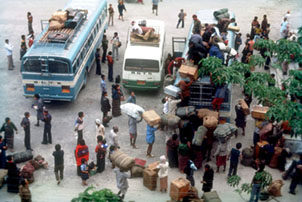
We arrived from Delhi at the Siliguri station with lots of bags and boxes,
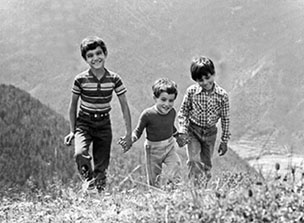
three little boys, our labrador Akbar, two tortoises and our faithful Ayah Rajamma.
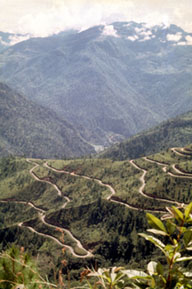
Bhutanese officials met and ushered us into the waiting transport for the journey to Thimphu, a 10 hour drive. The cars on offer - a jeep and a VW Beetle!
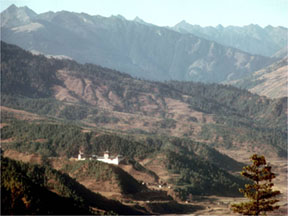
I believe everybody dreams of visiting the Kingdom of Bhutan one day. We were so very fortunate to actually participate in and contribute to the development of that enigmatic country.
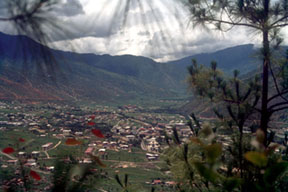
This is what Thimphu was like when we arrived, our home for the next 4 years. We arrived in December, the dead of winter ...
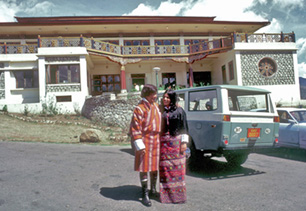
... and were installed in the Bhutan Hotel while our house was getting ready. One night we returned late to find our rooms full of smoke.

Akbar had knocked the strip heater over and burned a large hole in the expensive, wall-to-wall Tibetan carpet! Luckily there was no fire and the children were still fast asleep!
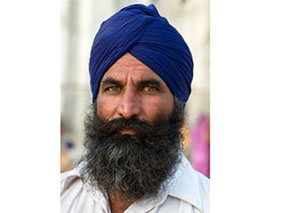
I woke Nataji, my genius Sardar technician, who quickly came up with a solution. We spent the rest of the night on our knees shaving pile off parts of the carpet. Then Sardarji used his hair fixer to stick the thousands of bits of wool into the charred hole! And the hotel management never noticed the damage!
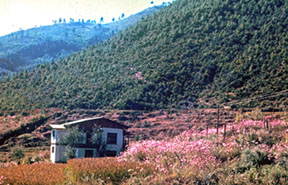
Our rented farmhouse was on the edge of the town surrounded by fields and forested hills.
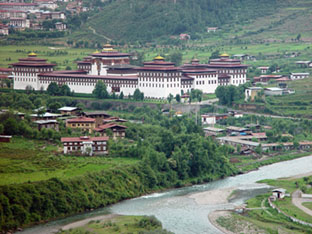
We had spectacular views of the valley and the river. The Thimphu Dzong … which houses the offices of the King and key ministries, as well as the top monk body… could clearly be seen in the distance.
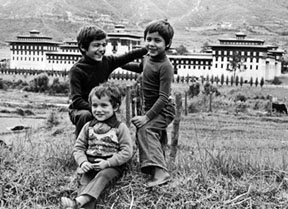
Our family expanded with dogs, cats, chickens, and ducks. We were often visited by wild life. Black bear would raid our corn field and one winter we even had a leopard come upstairs in search of a meal!
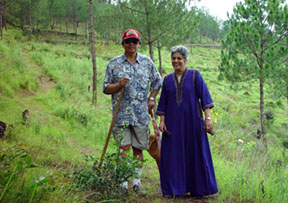
Our landlord was Bhutan’s foreign minister. He became a dear friend and often visited for a chat and a cup of tea. He once said... “small children, small problems, big children big problems, so enjoy your children while you have them” … and we most certainly did!
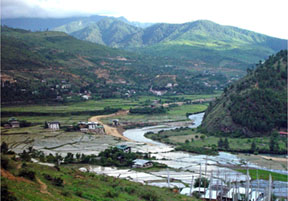
The 4-1/2 years that I served in Bhutan flew by and our lives were full and wonderful. Hootoksi was working for the Government ...
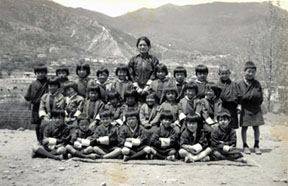
... and the children went to the local school in the mornings...

Most days after school they explored the hills above the house and went on picnics with friends.

Do you recognise these kids? Rahul. Akshaye, Gitanjali & Navaz came to visit ...
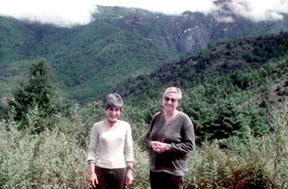
... As did Shehernavaz & Shannon.
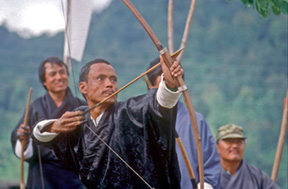
Archery is the national sport of Bhutan and is taken very seriously...
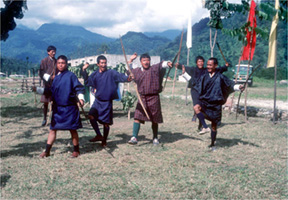
... in competitions between villages and districts. The stakes can be very high! The British ambassador, on an official visit for the King’s coronation, famously tried his hand with the traditional wooden bow ... letting fly, he missed the target and instead shot a spectator in the leg!
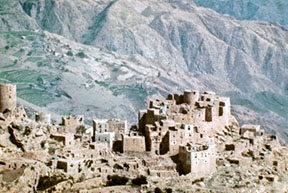
HOOTOKSI
Yemen! I had no idea what to expect and no notion of what it would mean to live in an Arab culture; and nothing I read, came anywhere close to what I actually experienced. I learned so much about relationships, honesty, openness, affection, respect, about caring and sharing, and most importantly, about love.
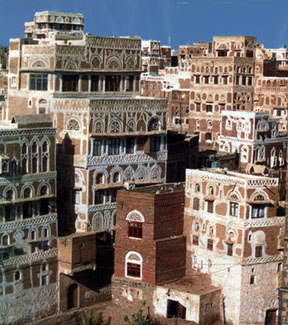
When I first set eyes on the capital Sana’a, I was stunned by the architecture of the Old City. It is a city inhabited for over 2500 years where people live even today, in the homes of their ancestors.
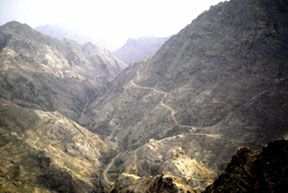
We were fortunate to spend weekends exploring the stark yet spectacular terrain and visiting the ancient villages and towns where we experienced first-hand the hospitality of the Yemani people.
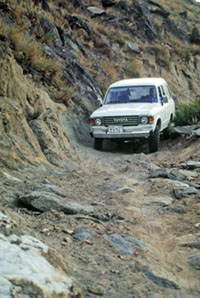
I was fortunate to accompany Robert on an official trip to Shahara, one of the oldest and most inaccessible settlements perched 2,600 meters on a mountain top. It is virtually impossible to get to and can only be reached by foot, donkey or in a powerful 4-wheel drive vehicle. The steep track to the village was strewn with large boulders over which we bumped along for hours on end.
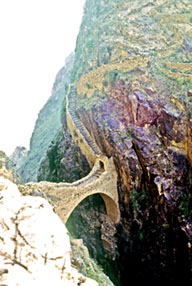
In this remote corner of the world is the most amazing limestone arch bridge which connects Shahara with another village across a 300 foot gorge. It was built in the 17th century, reputedly by one man, an incredible feat of engineering and architecture. While Robert worked I walked around the village and was invited into a home for tea.

The word had gone out that a stranger was walking around and most of the women and children of the village had gathered to see me. Unable to communicate in Arabic I began to sing! I was immediately joined by claps and cheers, a drum was brought out and we all began to dance. My song morphed into Yemani folk songs and we had the time of our lives communicating in the universal language of music!
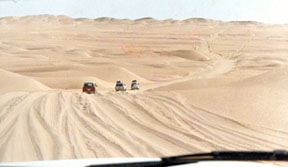
Another memorable journey was crossing the notorious, bandit-infested desert, the Rub Al Khali, or Empty Quarter. We planned the trip very carefully along with two other families.

The area was well known for political hijackings and kidnappings so we employed armed bodyguards, one in each of the cars for protection. Recognize the man in the middle?
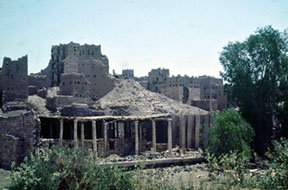
We drove to Marib, the fabled home of the Queen of Sheba where her temple and remnants of her famous dam stand to this day. From there we drove east through the Yemani portion of the Empty Quarter into the Hadramawt, which is the birth place of the Arab Civilization and cradle of the oasis culture.

This is the town of Shibam, famously known as the Chicago of the desert. The settlement is one of the earliest desert oases and dates back to the second century AD. The houses are built of mud and clay and some are 8 stories high!
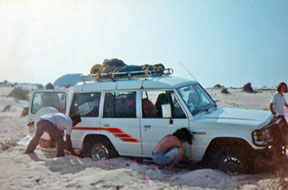
We soon became used to getting stuck in the sand and digging ourselves out.
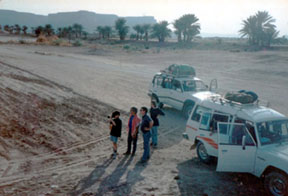
One afternoon, after a particularly long and difficult drive, we spotted an old Landcruiser barrelling towards us. Our hearts began to thump, our guards were tense, their Kalashnikovs at the ready.
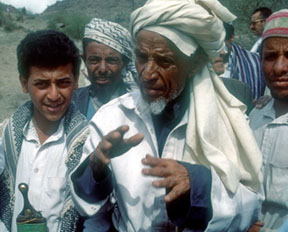
Several men spilled out of the Landcrusier and excitedly spoke to our driver. They demanded to know if there was a nurse or doctor amongst us. One of their wives was ill and needed an injection which they carried with them. It was their lucky day because with was Pauline, a nurse!
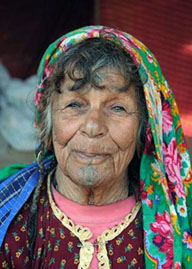
The Bedu woman had no compunction about hoisting her skirt and presenting her bare bottom for the shot! That done, they all jumped back into their vehicle with smiles and waves and sped away into the horizon from where they had materialized minutes ago!
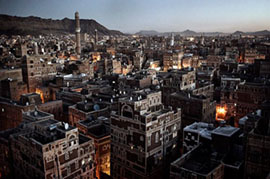
On our return to Sana’a we discovered that our cat Zubin had disappeared. In search of him I walked the streets calling his name.

The people around me went into spasms of laughter - and I couldn’t understand what was causing this mirth! I soon found Zubin and it was only days later when I was relating the incident to a Yemani friend that she also laughed out loud and said, “Zubi in Arabic means ‘my penis’!”
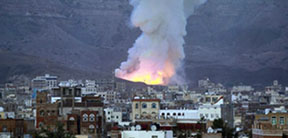
The war started before dawn on the 5th of May 1994. Robert & I were jolted out of bed by the most horrendous explosions and the deafening sound of jet fighters overhead. Hearts pounding, we dived for shelter and crouched on the floor as we had been instructed to do. War between the separatists in the south and the government in the north had begun!
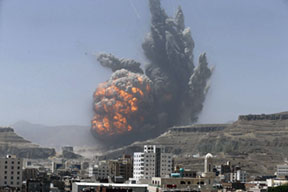
The UN had put emergency plans in place & Robert was a security warden for our area. Through that terrifying time, the trauma and tension, the ack-ack, artillery fire, the scud missile strikes, the power, water and telephone cuts, one incident remains imprinted on our hearts...
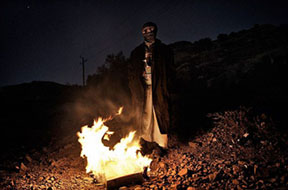
It was late in the evening, pitch dark outside, when we were alarmed by a loud banging on our gate! There was gun fire around and ack-ack tracers overhead, but as warden, Robert was compelled to investigate. At the gate stood Mohammed, a young Yemani friend of our son, Farhad. Knowing our children were away and we were alone, he risked his life by walking over to our house to give us candles and water and to check that we were OK.

Living and working in countries and cultures that are so diverse from each other and raising a family without family around, we learned the most important lesson of life..........
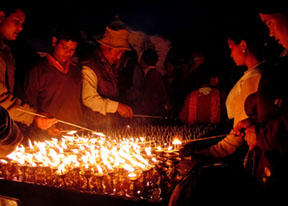
...Where there is a need it is always fulfilled by Love which transcends skin colour, language, race and religion. We have experienced this Love in all the countries and cultures that we have lived in and for this we are truly thankful.

The end.
